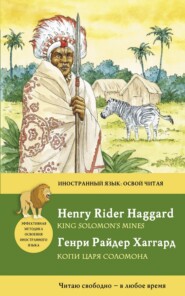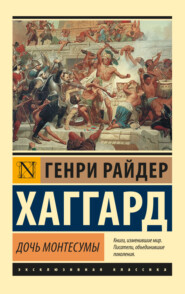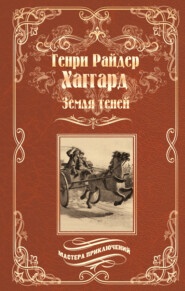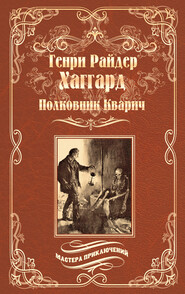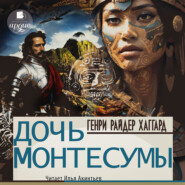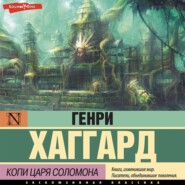По всем вопросам обращайтесь на: info@litportal.ru
(©) 2003-2024.
✖
The World's Desire
Настройки чтения
Размер шрифта
Высота строк
Поля
“Nay, speak,” cried the Queen.
“I know not the Gods of this land,” he answered. “If these people be favoured of the Gods, I say sit still. But if not,” then said the Wanderer, wise in war, “let Pharaoh gather his host, follow after the people, take them unawares, and smite them utterly. It is no hard task, they are so mixed a multitude and cumbered with much baggage!”
This was to speak as the Queen loved to hear. Now she clapped her hands and cried:
“Listen, listen to good counsel, Pharaoh.”
And now that the Apura were gone, his fear of them went also, and as he drank wine Pharaoh grew bold, till at last he sprang to his feet and swore by Amen, by Osiris, by Ptah, and by his father – great Rameses – that he would follow after the Apura and smite them. And instantly he sent forth messengers to summon the captains of his host in the Hall of Assembly.
Thither the captains came, and their plans were made and messengers hurried forth to the governors of other great cities, bidding them send troops to join the host of Pharaoh on its march.
Now Pharaoh turned to the Wanderer and said:
“Thou hast not yet answered my message that Rei carried to thee this morning. Wilt thou take service with me and be a captain in this war?”
The Wanderer little liked the name of service, but his warlike heart was stirred within him, for he loved the delight of battle. But before he could answer yea or nay, Meriamun the Queen, who was not minded that he should leave her, spoke hastily:
“This is my counsel, Meneptah, that the Lord Eperitus should abide here in Tanis and be the Captain of my Guard while thou art gone to smite the Apura. For I may not be here unguarded in these troublous times, and if I know he watches over me, he who is so mighty a man, then I shall walk safely and sleep in peace.”
Now the Wanderer bethought him of his desire to look upon the Hathor, for to see new things and try new adventures was always his delight. So he answered that if it were pleasing to Pharaoh and the Queen he would willingly stay and command the Guard. And Pharaoh said that it should be so.
IV THE QUEEN’S CHAMBER
At midday on the morrow Pharaoh and the host of Pharaoh marched in pomp from Tanis, taking the road that runs across the desert country towards the Red Sea of Weeds, the way that the Apura had gone. The Wanderer went with the army for an hour’s journey and more, in a chariot driven by Rei the Priest, for Rei did not march with the host. The number of the soldiers of Pharaoh amazed the Achæan, accustomed to the levies of barren isles and scattered tribes. But he said nothing of his wonder to Rei or any man, lest it should be thought that he came from among a little people. He even made as if he held the army lightly, and asked the priest if this was all the strength of Pharaoh! Then Rei told him that it was but a fourth part, for none of the mercenaries and none of the soldiers from the Upper Land marched with the King in pursuit of the Apura.
Then the Wanderer knew that he was come among a greater people than he had ever encountered yet, on land or sea. So he went with them till the roads divided, and there he drove his chariot to the chariot of Pharaoh and bade him farewell. Pharaoh called to him to mount his own chariot, and spake thus to him:
“Swear to me, thou Wanderer, who namest thyself Eperitus, though of what country thou art and what was thy father’s house none know, swear to me that thou wilt guard Meriamun the Queen faithfully, and wilt work no woe upon me nor open my house while I am afar. Great thou art and beautiful to look on, ay, and strong enough beyond the strength of men, yet my heart misdoubts me of thee. For methinks thou art a crafty man, and that evil will come upon me through thee.”
“If this be thy mind, Pharaoh,” said the Wanderer, “leave me not in guard of the Queen. And yet methinks I did not befriend thee so ill two nights gone, when the rabble would have put thee and all thy house to the sword because of the death of the firstborn.”
Now Pharaoh looked on him long and doubtfully, then stretched out his hand. The Wanderer took it, and swore by his own Gods, by Zeus, by Aphrodite, and Athene, and Apollo, that he would be true to the trust.
“I believe thee, Wanderer,” said Pharaoh. “Know this, if thou keepest thine oath thou shalt have great rewards, and thou shalt be second to none in the land of Khem, but if thou failest, then thou shalt die miserably.”
“I ask no fee,” answered the Wanderer, “and I fear no death, for in one way only shall I die, and that is known to me. Yet I will keep my oath.” And he bowed before Pharaoh, and leaping from his chariot entered again into the chariot of Rei.
Now, as he drove back through the host the soldiers called to him, saying:
“Leave us not, Wanderer.” For he looked so glorious in his golden armour that it seemed to them as though a god departed from their ranks.
His heart was with them, for he loved war, and he did not love the Apura. But he drove on, as so it must be, and came to the Palace at sundown.
That night he sat at the feast by the side of Meriamun the Queen. And when the feast was done she bade him follow her into her chamber where she sat when she would be alone. It was a fragrant chamber, dimly lighted with sweet-scented lamps, furnished with couches of ivory and gold, while all the walls told painted stories of strange gods and kings, and of their loves and wars. The Queen sank back upon the embroidered cushions of a couch and bade the wise Odysseus to sit guard over against her, so near that her robes swept his golden greaves. This he did somewhat against his will, though he was no hater of fair women. But his heart misdoubted the dark-eyed Queen, and he looked upon her guardedly, for she was strangely fair to see, the fairest of all mortal women whom he had known, save the Golden Helen.
“Wanderer, we owe thee great thanks, and I would gladly know to whom we are in debt for the prices of our lives,” she said. “Tell me of thy birth, of thy father’s house, and of the lands that thou hast seen and the wars wherein thou hast fought. Tell me also of the sack of Ilios, and how thou camest by thy golden mail. The unhappy Paris wore such arms as these, if the minstrel of the North sang truth.”
Now, the Wanderer would gladly have cursed this minstrel of the North and his songs.
“Minstrels will be lying, Lady,” he said, “and they gather old tales wherever they go. Paris may have worn my arms, or another man. I bought them from a chapman in Crete, and asked nothing of their first master. As for Ilios, I fought there in my youth, and served the Cretan Idomeneus, but I got little booty. To the King the wealth and women, to us the sword-strokes. Such is the appearance of war.”
Meriamun listened to his tale, which he set forth roughly, as if he were some blunt, grumbling swordsman, and darkly she looked on him while she hearkened, and darkly she smiled as she looked.
“A strange story, Eperitus, a strange story truly. Now tell me thus. How camest thou by yonder great bow, the bow of the swallow string? If my minstrel spoke truly, it was once the Bow of Eurytus of OEchalia.”
Now the Wanderer glanced round him like a man taken in ambush, who sees on every hand the sword of foes shine up into the sunlight.
“The bow, Lady?” he answered readily enough. “I got it strangely. I was cruising with a cargo of iron on the western coast and landed on an isle, methinks the pilot called it Ithaca. There we found nothing but death; a pestilence had been in the land, but in a ruined hall this bow was lying, and I made prize of it. A good bow!”
“A strange story, truly – a very strange story,” quoth Meriamun the Queen. “By chance thou didst buy the armour of Paris, by chance thou didst find the bow of Eurytus, that bow, methinks, with which the god-like Odysseus slew the wooers in his halls. Knowest thou, Eperitus, that when thou stoodest yonder on the board in the Place of Banquets, when the great bow twanged and the long shafts hailed down on the hall and loosened the knees of many, not a little was I put in mind of the song of the slaying of the wooers at the hands of Odysseus. The fame of Odysseus has wandered far – ay, even to Khem.” And she looked straight at him.
The Wanderer darkened his face and put the matter by. He had heard something of that tale, he said, but deemed it a minstrel’s feigning. One man could not fight a hundred, as the story went.
The Queen half rose from the couch where she lay curled up like a glittering snake. Like a snake she rose and watched him with her melancholy eyes.
“Strange, indeed – most strange that Odysseus, Laertes’ son, Odysseus of Ithaca, should not know the tale of the slaying of the wooers by Odysseus’ self. Strange, indeed, thou Eperitus, who art Odysseus.”
Now the neck of the Wanderer was in the noose, and well he knew it: yet he kept his counsel, and looked upon her vacantly.
“Men say that this Odysseus wandered years ago into the North, and that this time he will not come again. I saw him in the wars, and he was a taller man than I,” said the Wanderer.
“I have always heard,” said the Queen, “that Odysseus was double-tongued and crafty as a fox. Look me in the eyes, thou Wanderer, look me in the eyes, and I will show thee whether or not thou art Odysseus,” and she leaned forward so that her hair well-nigh swept his brow, and gazed deep into his eyes.
Now the Wanderer was ashamed to drop his eyes before a woman’s, and he could not rise and go; so he must needs gaze, and as he gazed his head grew strangely light and the blood quivered in his veins, and then seemed to stop.
“Now turn, thou Wanderer,” said the voice of the Queen, and to him it sounded far away, as if there was a wall between them, “and tell me what thou seest.”
So he turned and looked towards the dark end of the chamber. But presently through the darkness stole a faint light, like the first grey light of the dawn, and now he saw a shape, like the shape of a great horse of wood, and behind the horse were black square towers of huge stones, and gates, and walls, and houses. Now he saw a door open in the side of the horse, and the helmeted head of a man look out wearily. As he looked a great white star slid down the sky so that the light of it rested on the face of the man, and that face was his own! Then he remembered how he had looked forth from the belly of the wooden horse as it stood within the walls of Ilios, and thus the star had seemed to fall upon the doomed city, an omen of the end of Troy.
“Look again,” said the voice of Meriamun from far away.
So once more he looked into the darkness, and there he saw the mouth of a cave, and beneath two palms in front of it sat a man and a woman. The yellow moon rose and its light fell upon a sleeping sea, upon tall trees, upon the cave, and the two who sat there. The woman was lovely, with braided hair, and clad in a shining robe, and her eyes were dim with tears that she might never shed: for she was a Goddess, Calypso, the daughter of Atlas. Then in the vision the man looked up, and his face was weary, and worn and sick for home, but it was his own face.
Then he remembered how he had sat thus at the side of Calypso of the braided tresses, on that last night of all his nights in her wave-girt isle, the centre of the seas.
“Look once more,” said the voice of Meriamun the Queen.
Again he looked into the darkness. There before him grew the ruins of his own hall in Ithaca, and in the courtyard before the hall was a heap of ashes, and the charred bones of men. Before the heap lay the figure of one lost in sorrow, for his limbs writhed upon the ground. Anon the man lifted his face, and behold! the Wanderer knew that it was his own face.
Then of a sudden the gloom passed away from the chamber, and once more his blood surged through his veins, and there before him sat Meriamun the Queen, smiling darkly.
“Strange sights hast thou seen, is it not so, Wanderer?” she said.
“Yea, Queen, the most strange of sights. Tell me of thy courtesy how thou didst conjure them before my eyes.”
“By the magic that I have, Eperitus, I above all wizards who dwell in Khem, the magic whereby I can read all the past of those – I love,” and again she looked upon him; “ay, and call it forth from the storehouse of dead time and make it live again. Say, whose face was it that thou didst look upon – was it not the face of Odysseus of Ithaca, Laertes’ son, and was not that face thine?”
Now the Wanderer saw that there was no escape. Therefore he spoke the truth, not because he loved it, but because he must.
“I know not the Gods of this land,” he answered. “If these people be favoured of the Gods, I say sit still. But if not,” then said the Wanderer, wise in war, “let Pharaoh gather his host, follow after the people, take them unawares, and smite them utterly. It is no hard task, they are so mixed a multitude and cumbered with much baggage!”
This was to speak as the Queen loved to hear. Now she clapped her hands and cried:
“Listen, listen to good counsel, Pharaoh.”
And now that the Apura were gone, his fear of them went also, and as he drank wine Pharaoh grew bold, till at last he sprang to his feet and swore by Amen, by Osiris, by Ptah, and by his father – great Rameses – that he would follow after the Apura and smite them. And instantly he sent forth messengers to summon the captains of his host in the Hall of Assembly.
Thither the captains came, and their plans were made and messengers hurried forth to the governors of other great cities, bidding them send troops to join the host of Pharaoh on its march.
Now Pharaoh turned to the Wanderer and said:
“Thou hast not yet answered my message that Rei carried to thee this morning. Wilt thou take service with me and be a captain in this war?”
The Wanderer little liked the name of service, but his warlike heart was stirred within him, for he loved the delight of battle. But before he could answer yea or nay, Meriamun the Queen, who was not minded that he should leave her, spoke hastily:
“This is my counsel, Meneptah, that the Lord Eperitus should abide here in Tanis and be the Captain of my Guard while thou art gone to smite the Apura. For I may not be here unguarded in these troublous times, and if I know he watches over me, he who is so mighty a man, then I shall walk safely and sleep in peace.”
Now the Wanderer bethought him of his desire to look upon the Hathor, for to see new things and try new adventures was always his delight. So he answered that if it were pleasing to Pharaoh and the Queen he would willingly stay and command the Guard. And Pharaoh said that it should be so.
IV THE QUEEN’S CHAMBER
At midday on the morrow Pharaoh and the host of Pharaoh marched in pomp from Tanis, taking the road that runs across the desert country towards the Red Sea of Weeds, the way that the Apura had gone. The Wanderer went with the army for an hour’s journey and more, in a chariot driven by Rei the Priest, for Rei did not march with the host. The number of the soldiers of Pharaoh amazed the Achæan, accustomed to the levies of barren isles and scattered tribes. But he said nothing of his wonder to Rei or any man, lest it should be thought that he came from among a little people. He even made as if he held the army lightly, and asked the priest if this was all the strength of Pharaoh! Then Rei told him that it was but a fourth part, for none of the mercenaries and none of the soldiers from the Upper Land marched with the King in pursuit of the Apura.
Then the Wanderer knew that he was come among a greater people than he had ever encountered yet, on land or sea. So he went with them till the roads divided, and there he drove his chariot to the chariot of Pharaoh and bade him farewell. Pharaoh called to him to mount his own chariot, and spake thus to him:
“Swear to me, thou Wanderer, who namest thyself Eperitus, though of what country thou art and what was thy father’s house none know, swear to me that thou wilt guard Meriamun the Queen faithfully, and wilt work no woe upon me nor open my house while I am afar. Great thou art and beautiful to look on, ay, and strong enough beyond the strength of men, yet my heart misdoubts me of thee. For methinks thou art a crafty man, and that evil will come upon me through thee.”
“If this be thy mind, Pharaoh,” said the Wanderer, “leave me not in guard of the Queen. And yet methinks I did not befriend thee so ill two nights gone, when the rabble would have put thee and all thy house to the sword because of the death of the firstborn.”
Now Pharaoh looked on him long and doubtfully, then stretched out his hand. The Wanderer took it, and swore by his own Gods, by Zeus, by Aphrodite, and Athene, and Apollo, that he would be true to the trust.
“I believe thee, Wanderer,” said Pharaoh. “Know this, if thou keepest thine oath thou shalt have great rewards, and thou shalt be second to none in the land of Khem, but if thou failest, then thou shalt die miserably.”
“I ask no fee,” answered the Wanderer, “and I fear no death, for in one way only shall I die, and that is known to me. Yet I will keep my oath.” And he bowed before Pharaoh, and leaping from his chariot entered again into the chariot of Rei.
Now, as he drove back through the host the soldiers called to him, saying:
“Leave us not, Wanderer.” For he looked so glorious in his golden armour that it seemed to them as though a god departed from their ranks.
His heart was with them, for he loved war, and he did not love the Apura. But he drove on, as so it must be, and came to the Palace at sundown.
That night he sat at the feast by the side of Meriamun the Queen. And when the feast was done she bade him follow her into her chamber where she sat when she would be alone. It was a fragrant chamber, dimly lighted with sweet-scented lamps, furnished with couches of ivory and gold, while all the walls told painted stories of strange gods and kings, and of their loves and wars. The Queen sank back upon the embroidered cushions of a couch and bade the wise Odysseus to sit guard over against her, so near that her robes swept his golden greaves. This he did somewhat against his will, though he was no hater of fair women. But his heart misdoubted the dark-eyed Queen, and he looked upon her guardedly, for she was strangely fair to see, the fairest of all mortal women whom he had known, save the Golden Helen.
“Wanderer, we owe thee great thanks, and I would gladly know to whom we are in debt for the prices of our lives,” she said. “Tell me of thy birth, of thy father’s house, and of the lands that thou hast seen and the wars wherein thou hast fought. Tell me also of the sack of Ilios, and how thou camest by thy golden mail. The unhappy Paris wore such arms as these, if the minstrel of the North sang truth.”
Now, the Wanderer would gladly have cursed this minstrel of the North and his songs.
“Minstrels will be lying, Lady,” he said, “and they gather old tales wherever they go. Paris may have worn my arms, or another man. I bought them from a chapman in Crete, and asked nothing of their first master. As for Ilios, I fought there in my youth, and served the Cretan Idomeneus, but I got little booty. To the King the wealth and women, to us the sword-strokes. Such is the appearance of war.”
Meriamun listened to his tale, which he set forth roughly, as if he were some blunt, grumbling swordsman, and darkly she looked on him while she hearkened, and darkly she smiled as she looked.
“A strange story, Eperitus, a strange story truly. Now tell me thus. How camest thou by yonder great bow, the bow of the swallow string? If my minstrel spoke truly, it was once the Bow of Eurytus of OEchalia.”
Now the Wanderer glanced round him like a man taken in ambush, who sees on every hand the sword of foes shine up into the sunlight.
“The bow, Lady?” he answered readily enough. “I got it strangely. I was cruising with a cargo of iron on the western coast and landed on an isle, methinks the pilot called it Ithaca. There we found nothing but death; a pestilence had been in the land, but in a ruined hall this bow was lying, and I made prize of it. A good bow!”
“A strange story, truly – a very strange story,” quoth Meriamun the Queen. “By chance thou didst buy the armour of Paris, by chance thou didst find the bow of Eurytus, that bow, methinks, with which the god-like Odysseus slew the wooers in his halls. Knowest thou, Eperitus, that when thou stoodest yonder on the board in the Place of Banquets, when the great bow twanged and the long shafts hailed down on the hall and loosened the knees of many, not a little was I put in mind of the song of the slaying of the wooers at the hands of Odysseus. The fame of Odysseus has wandered far – ay, even to Khem.” And she looked straight at him.
The Wanderer darkened his face and put the matter by. He had heard something of that tale, he said, but deemed it a minstrel’s feigning. One man could not fight a hundred, as the story went.
The Queen half rose from the couch where she lay curled up like a glittering snake. Like a snake she rose and watched him with her melancholy eyes.
“Strange, indeed – most strange that Odysseus, Laertes’ son, Odysseus of Ithaca, should not know the tale of the slaying of the wooers by Odysseus’ self. Strange, indeed, thou Eperitus, who art Odysseus.”
Now the neck of the Wanderer was in the noose, and well he knew it: yet he kept his counsel, and looked upon her vacantly.
“Men say that this Odysseus wandered years ago into the North, and that this time he will not come again. I saw him in the wars, and he was a taller man than I,” said the Wanderer.
“I have always heard,” said the Queen, “that Odysseus was double-tongued and crafty as a fox. Look me in the eyes, thou Wanderer, look me in the eyes, and I will show thee whether or not thou art Odysseus,” and she leaned forward so that her hair well-nigh swept his brow, and gazed deep into his eyes.
Now the Wanderer was ashamed to drop his eyes before a woman’s, and he could not rise and go; so he must needs gaze, and as he gazed his head grew strangely light and the blood quivered in his veins, and then seemed to stop.
“Now turn, thou Wanderer,” said the voice of the Queen, and to him it sounded far away, as if there was a wall between them, “and tell me what thou seest.”
So he turned and looked towards the dark end of the chamber. But presently through the darkness stole a faint light, like the first grey light of the dawn, and now he saw a shape, like the shape of a great horse of wood, and behind the horse were black square towers of huge stones, and gates, and walls, and houses. Now he saw a door open in the side of the horse, and the helmeted head of a man look out wearily. As he looked a great white star slid down the sky so that the light of it rested on the face of the man, and that face was his own! Then he remembered how he had looked forth from the belly of the wooden horse as it stood within the walls of Ilios, and thus the star had seemed to fall upon the doomed city, an omen of the end of Troy.
“Look again,” said the voice of Meriamun from far away.
So once more he looked into the darkness, and there he saw the mouth of a cave, and beneath two palms in front of it sat a man and a woman. The yellow moon rose and its light fell upon a sleeping sea, upon tall trees, upon the cave, and the two who sat there. The woman was lovely, with braided hair, and clad in a shining robe, and her eyes were dim with tears that she might never shed: for she was a Goddess, Calypso, the daughter of Atlas. Then in the vision the man looked up, and his face was weary, and worn and sick for home, but it was his own face.
Then he remembered how he had sat thus at the side of Calypso of the braided tresses, on that last night of all his nights in her wave-girt isle, the centre of the seas.
“Look once more,” said the voice of Meriamun the Queen.
Again he looked into the darkness. There before him grew the ruins of his own hall in Ithaca, and in the courtyard before the hall was a heap of ashes, and the charred bones of men. Before the heap lay the figure of one lost in sorrow, for his limbs writhed upon the ground. Anon the man lifted his face, and behold! the Wanderer knew that it was his own face.
Then of a sudden the gloom passed away from the chamber, and once more his blood surged through his veins, and there before him sat Meriamun the Queen, smiling darkly.
“Strange sights hast thou seen, is it not so, Wanderer?” she said.
“Yea, Queen, the most strange of sights. Tell me of thy courtesy how thou didst conjure them before my eyes.”
“By the magic that I have, Eperitus, I above all wizards who dwell in Khem, the magic whereby I can read all the past of those – I love,” and again she looked upon him; “ay, and call it forth from the storehouse of dead time and make it live again. Say, whose face was it that thou didst look upon – was it not the face of Odysseus of Ithaca, Laertes’ son, and was not that face thine?”
Now the Wanderer saw that there was no escape. Therefore he spoke the truth, not because he loved it, but because he must.






